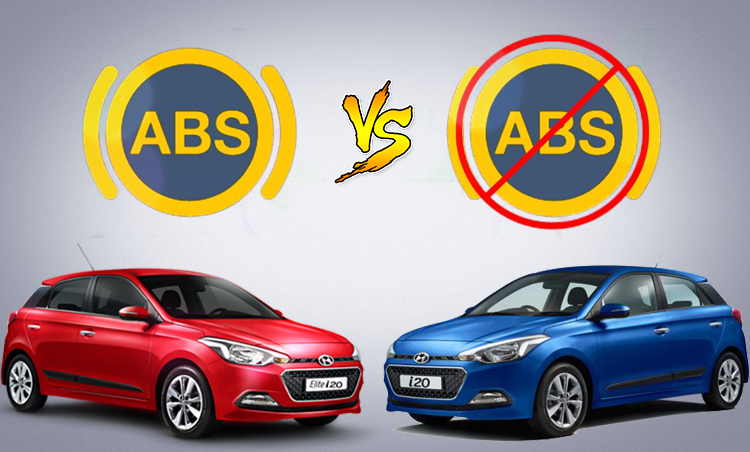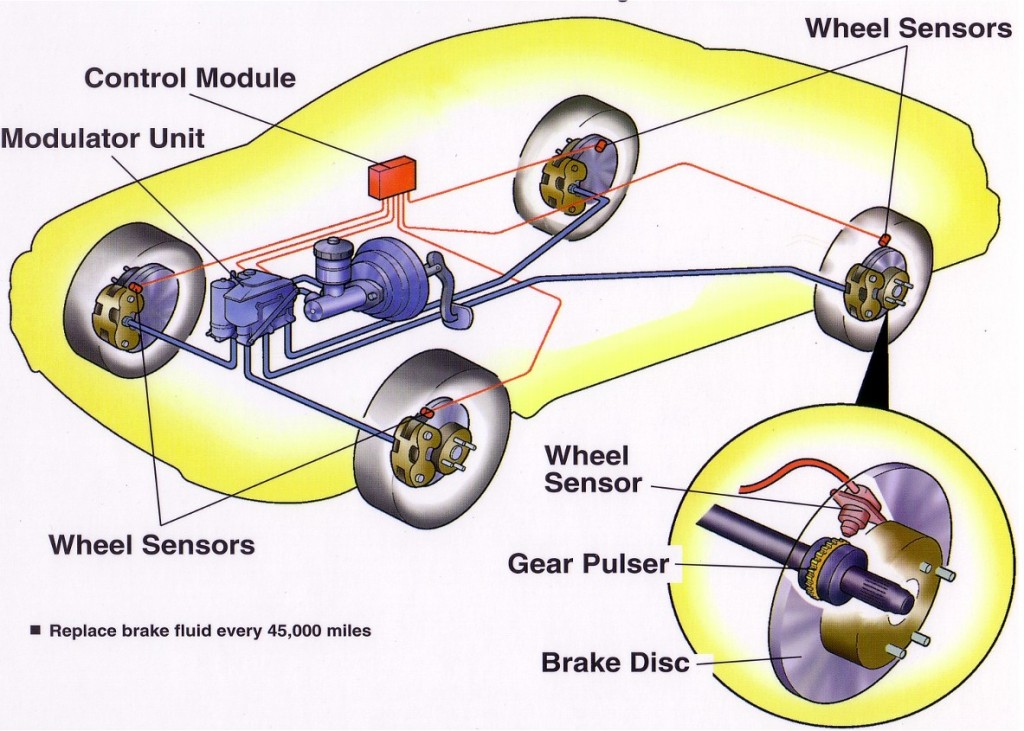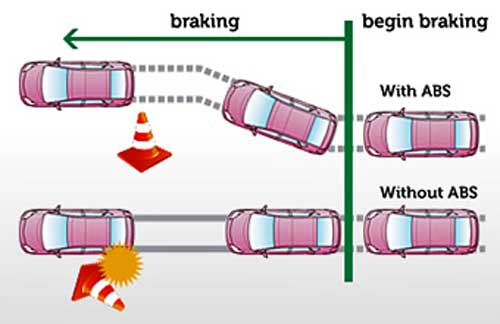ABS or Non ABS Cars: What Difference Does it Make?
Often when we buy a car, we just focus on the looks, brand and budget. However, one also needs to anticipate about the safety aspect. Having a four-wheeler by your side gives you a lot of convenience as well as a social status, but that’s not where it ends. There is always a danger of accident-like conditions which may occur anytime, anywhere. Hence, the range of safety features on the offer cannot be ignored at all.
Talking about safety, it makes sense to discuss the ABS vs non-ABS cars. This braking system is one of the most essential components fitted inside the car. Nowadays, the traffic conditions are becoming out of control, thereby giving a rise in the number of accidents. In such a situation, not only we need to assure that our car is ready to protect us from any hazards, but it also becomes extremely necessary to get a know-how about the braking system.
In order to analyse the ABS vs non-ABS cars, we need to make ourself well aware about the whole matter. How crucial is it to have ABS in cars? Who wins the battle- ABS or no-ABS? Let’s take a look at the discussion below:
What is Anti-lock Braking System?
The first and foremost thing that you need to clearly understand is the basic meaning of an ABS (Anti-Lock Braking System). This system is a safety arrangement whereby the wheels of an automobile are allowed to keep a tractive contract with road’s surface as per the driver’s inputs when he applies the brakes.
It prevents the wheels from being locked up and hence the uncontrolled skidding situation can be avoided. The automated setup utilises the same principles like threshold braking and cadence braking which were used by some skilful drivers while working on previous generation braking systems. It does the same thing but it’s way more quick and efficient at control.
So, basically the ABS is aimed at detecting the locking of wheels by monitoring the speed of each moving wheel. In case sudden brakes are applied, it releases pressure thereby providing sufficient braking pressure to each wheel. This in turn helps in avoiding skidding and the driver will be able to have a better control on the steering, while handling the brakes at the same time.
Who Invented Anti Lock Braking System?
Anti-lock Braking System came into existence in the year 1920, when an automobile and aircraft pioneer named Gabriel Voisin came up with idea of anti-lock brakes while working on the barking problems of an aircraft. However, it took several years until a proper system was introduced for the cars.
Firstly, it started with an ABS for rear wheel drive by General Motors and then Mercedes S-Class was equipped with a forward wheel drive ABS. Today, this mechanism has been developed and is running successfully. Almost every car and bike is made available with an ABS alongside EBD.
How Does it Work?
The mechanism of ABS is a simple process and easy to understand. Basically, it has 4 components namely, speed sensors, pump, valves and controller. There are speed sensors installed either at all the wheels or at the differential, which detect a skid in the wheels. The controller which is responsible for controlling the valves constantly monitors this information and observes any deceleration during panic braking.
In such a situation, the pressure to that particular brake is decreased by the controller until it finds any acceleration. Similarly it increases the pressure again till there isn’t any deceleration.
All this is done in a quick way before the tyres get to judge any change in the speed. This implies that the tyres slows down at the same pace as the vehicle, wherein the brakes keep the tyres closest to that point where they get locked. Because of the quick opening and closing of the valves, the complete process can be felt at the brake pedal in the form of a pulsating activity.
Do Anti-lock Brakes Reduce Braking Distance?
As we have mentioned above, the ABS mechanism prevents the locking up of wheels and is aimed at doing two tasks- allowing steering control while braking and reduce the braking distance. It prevents the wheels from skidding and then you will be able to stop faster. However, there are both sides of the argument, which we have analysed below:
YES
In normal driving conditions, ABS is able to apply the most effective kind of braking to each wheel and at the same time prevents each of them from being locked. When there is no ABS, the braking doesn’t get distributed like this and it could even spin under heavy braking conditions. Since ABS prevents the wheels from skidding, you will be able to stop faster. Therefore, we can simply say that an Anti-lock Braking System reduces the stopping distance.
NO
Another argument says that ABS actually doesn’t work this way when we observe it in reality. While applying sudden brakes on a dry or icy surface, the stopping distance will be same as it’s found in the case of a conventional braking system. In some cases when the road has loose gravel or a snowy surface, it could even increase the stopping distance.
According to some studies which were conducted on ABS, it has been observed that in certain situations, the distance that is needed to bring a vehicle to a complete halt can even increase. So, the whether there is an ABS or no ABS, a driver should primarily focus on the fact that he/she should keep a safe distance irrespective to the kind of road conditions.
Statistical Figures:
The significance of ABS is quite evident with the fact that automakers are offering this system even with the base models and the buyers are also preferring cars with ABS. As per a report by ET Auto, 14% of car accidents taking place on the Indian highways could be avoided with the help of ABS that lets the driver take control over the steering while applying brakes.
It also states that 6% of casualties in highway accidents can be eliminated through ABS which reduces braking distance. So, overall a total of 20% accidents casualties which also means every 5th accident on Indian Highways can be avoided if all cars have ABS fitted in them.
Advantages of ABS
-
With ABS fitted in your car, you can avail a stable braking as it doesn’t let the wheels lock up and hence the vehicle can be prevented from overturning.
-
This braking system reduces the friction between wheels and the road and hence the efficiency of the tires can be increased up to 30%.
-
ABS cars are believed to have a less stopping distance as compared to the non-ABS ones because the wheel does not waste any distance in skidding.
-
It lets you keep a control over steering and thus you can steer your automobile smoothly while handling the brakes.
Disadvantages of ABS
-
Since an ABS comprises a lot of components, the buyers have to pay an additional amount for car equipped with ABS as compared to a car with no ABS.
-
Along with the initial value, the maintenance of an ABS car is also a considerable factor. The complex fitments like sensors and controller need to be maintained regularly. So, if you want to avoid any additional cost, you will have to keep an eye on everything.
-
Since it is an automated electronic system, it’s quite complex and adding such components to the vehicle may lead to system damage.
-
Under varying situations and on different surfaces, this braking system could cause an inconsistent braking distance instead of bringing it down.
Here Is the Real Time Demo to Clear Your Confusions
Final Words
As there are two sides of each coin, it is quite complex to determine a definite answer on ABS vs non ABS cars. However, for most of the reasons concerned with the safety of occupants, it can’t be denied that the Anti-lock Braking System is gaining a lot of relevance in today’s time. Since most of the cars are now available with ABS & EBD, it makes sense as to why it’s considered to be safer than the conventional braking system.
On the other hand, even if in practicality, it’s costly and requires maintenance, it would be logical to give priority to the safety aspect. No matter if it increases the stopping distance or doesn’t make any difference at all, it would always be better than a car with no ABS at all.
We hope that you liked our detailed discussion on ABS vs non-ABS cars. If you have any suggestions or feedbacks, you can let us know in the comments section below.
ABS or Non ABS Cars: What Difference Does it Make?
http://www.blog.sagmart.com/wp-content/uploads/2016/05/ABS-vs-Non-ABS-300x300.jpg All About CarsAutomobiles ABS,ABS Cars in India,ABS SystemOften when we buy a car, we just focus on the looks, brand and budget. However, one also needs to anticipate about the safety aspect. Having a four-wheeler by your side gives you a lot of convenience as well as a social status, but that’s not where it ends. There is always a danger of accident-like conditions which may occur anytime, anywhere. Hence, the range of safety features on the offer cannot be ignored at all.
Talking about safety, it makes sense to discuss the ABS vs non-ABS cars. This braking system is one of the most essential components fitted inside the car. Nowadays, the traffic conditions are becoming out of control, thereby giving a rise in the number of accidents. In such a situation, not only we need to assure that our car is ready to protect us from any hazards, but it also becomes extremely necessary to get a know-how about the braking system.
In order to analyse the ABS vs non-ABS cars, we need to make ourself well aware about the whole matter. How crucial is it to have ABS in cars? Who wins the battle- ABS or no-ABS? Let’s take a look at the discussion below:
What is Anti-lock Braking System?
The first and foremost thing that you need to clearly understand is the basic meaning of an ABS (Anti-Lock Braking System). This system is a safety arrangement whereby the wheels of an automobile are allowed to keep a tractive contract with road’s surface as per the driver’s inputs when he applies the brakes.
It prevents the wheels from being locked up and hence the uncontrolled skidding situation can be avoided. The automated setup utilises the same principles like threshold braking and cadence braking which were used by some skilful drivers while working on previous generation braking systems. It does the same thing but it’s way more quick and efficient at control.
So, basically the ABS is aimed at detecting the locking of wheels by monitoring the speed of each moving wheel. In case sudden brakes are applied, it releases pressure thereby providing sufficient braking pressure to each wheel. This in turn helps in avoiding skidding and the driver will be able to have a better control on the steering, while handling the brakes at the same time.
Who Invented Anti Lock Braking System?
Anti-lock Braking System came into existence in the year 1920, when an automobile and aircraft pioneer named Gabriel Voisin came up with idea of anti-lock brakes while working on the barking problems of an aircraft. However, it took several years until a proper system was introduced for the cars.
Firstly, it started with an ABS for rear wheel drive by General Motors and then Mercedes S-Class was equipped with a forward wheel drive ABS. Today, this mechanism has been developed and is running successfully. Almost every car and bike is made available with an ABS alongside EBD.
How Does it Work?
The mechanism of ABS is a simple process and easy to understand. Basically, it has 4 components namely, speed sensors, pump, valves and controller. There are speed sensors installed either at all the wheels or at the differential, which detect a skid in the wheels. The controller which is responsible for controlling the valves constantly monitors this information and observes any deceleration during panic braking.
In such a situation, the pressure to that particular brake is decreased by the controller until it finds any acceleration. Similarly it increases the pressure again till there isn’t any deceleration.
All this is done in a quick way before the tyres get to judge any change in the speed. This implies that the tyres slows down at the same pace as the vehicle, wherein the brakes keep the tyres closest to that point where they get locked. Because of the quick opening and closing of the valves, the complete process can be felt at the brake pedal in the form of a pulsating activity.
Do Anti-lock Brakes Reduce Braking Distance?
As we have mentioned above, the ABS mechanism prevents the locking up of wheels and is aimed at doing two tasks- allowing steering control while braking and reduce the braking distance. It prevents the wheels from skidding and then you will be able to stop faster. However, there are both sides of the argument, which we have analysed below:
YES
In normal driving conditions, ABS is able to apply the most effective kind of braking to each wheel and at the same time prevents each of them from being locked. When there is no ABS, the braking doesn’t get distributed like this and it could even spin under heavy braking conditions. Since ABS prevents the wheels from skidding, you will be able to stop faster. Therefore, we can simply say that an Anti-lock Braking System reduces the stopping distance.
NO
Another argument says that ABS actually doesn’t work this way when we observe it in reality. While applying sudden brakes on a dry or icy surface, the stopping distance will be same as it’s found in the case of a conventional braking system. In some cases when the road has loose gravel or a snowy surface, it could even increase the stopping distance.
According to some studies which were conducted on ABS, it has been observed that in certain situations, the distance that is needed to bring a vehicle to a complete halt can even increase. So, the whether there is an ABS or no ABS, a driver should primarily focus on the fact that he/she should keep a safe distance irrespective to the kind of road conditions.
Statistical Figures:
The significance of ABS is quite evident with the fact that automakers are offering this system even with the base models and the buyers are also preferring cars with ABS. As per a report by ET Auto, 14% of car accidents taking place on the Indian highways could be avoided with the help of ABS that lets the driver take control over the steering while applying brakes.
It also states that 6% of casualties in highway accidents can be eliminated through ABS which reduces braking distance. So, overall a total of 20% accidents casualties which also means every 5th accident on Indian Highways can be avoided if all cars have ABS fitted in them.
Advantages of ABS
-
With ABS fitted in your car, you can avail a stable braking as it doesn’t let the wheels lock up and hence the vehicle can be prevented from overturning.
-
This braking system reduces the friction between wheels and the road and hence the efficiency of the tires can be increased up to 30%.
-
ABS cars are believed to have a less stopping distance as compared to the non-ABS ones because the wheel does not waste any distance in skidding.
-
It lets you keep a control over steering and thus you can steer your automobile smoothly while handling the brakes.
Disadvantages of ABS
-
Since an ABS comprises a lot of components, the buyers have to pay an additional amount for car equipped with ABS as compared to a car with no ABS.
-
Along with the initial value, the maintenance of an ABS car is also a considerable factor. The complex fitments like sensors and controller need to be maintained regularly. So, if you want to avoid any additional cost, you will have to keep an eye on everything.
-
Since it is an automated electronic system, it’s quite complex and adding such components to the vehicle may lead to system damage.
-
Under varying situations and on different surfaces, this braking system could cause an inconsistent braking distance instead of bringing it down.
Here Is the Real Time Demo to Clear Your Confusions
Final Words
As there are two sides of each coin, it is quite complex to determine a definite answer on ABS vs non ABS cars. However, for most of the reasons concerned with the safety of occupants, it can’t be denied that the Anti-lock Braking System is gaining a lot of relevance in today’s time. Since most of the cars are now available with ABS & EBD, it makes sense as to why it’s considered to be safer than the conventional braking system.
On the other hand, even if in practicality, it’s costly and requires maintenance, it would be logical to give priority to the safety aspect. No matter if it increases the stopping distance or doesn’t make any difference at all, it would always be better than a car with no ABS at all.
We hope that you liked our detailed discussion on ABS vs non-ABS cars. If you have any suggestions or feedbacks, you can let us know in the comments section below.




Leave a Reply